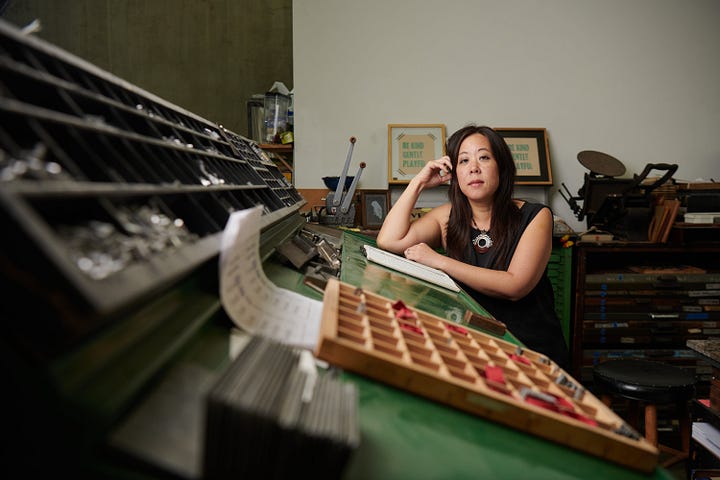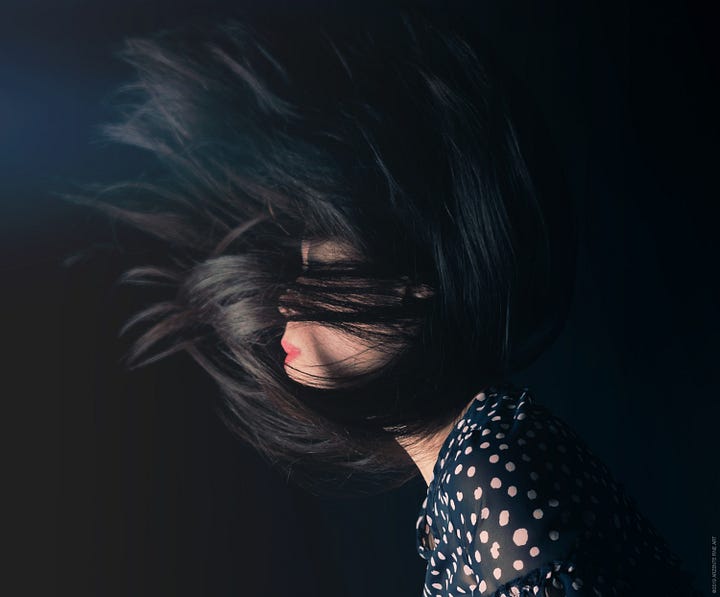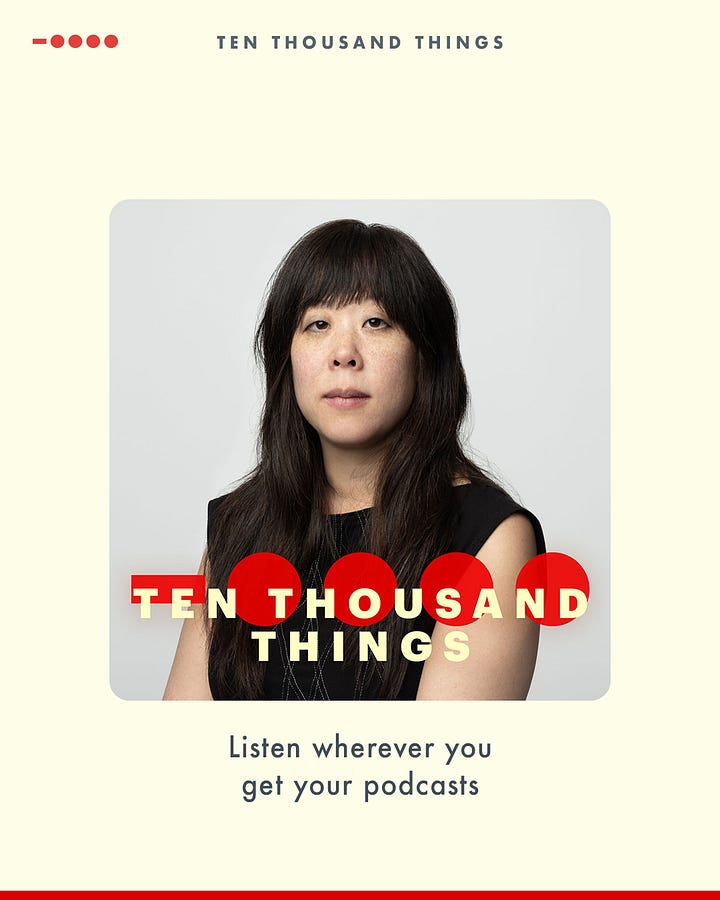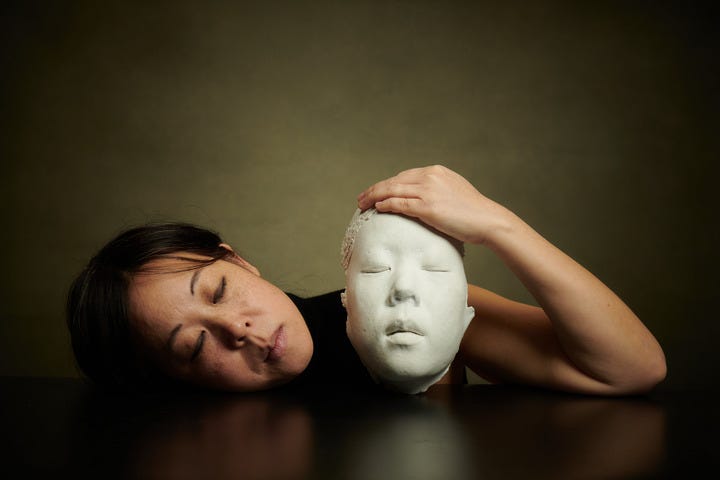Tell us about yourself and your most current project/s?
I’m a poet and won the 2024 Shelley Memorial Award from the Poetry Society of American for poetic genius – an award given previously to poets Yusef Komunyakaa, Lucille Clifton, W.S. Merwin, Gary Snyder, and Robert Duncan. I am the most recent Civic Poet (Poet Laureate) of the City of Seattle. Recently, I sold my artistic papers and literary archives to Yale University’s Beinecke Library. That was a very large archival project that involved looking back at 45 years of personal artifacts and creative production and getting it all organized.
In the past couple of years, I moved into making audio stories and produced a podcast with KUOW Public Radio for three seasons. My show, Ten Thousand Things, focuses on Asian American stories and went independent after the third season. I’m working on developing a 5th season now, while also fundraising for the show. I’m currently writing a non-fiction book about stories adjacent to the podcast for the University of Washington Press.
Where did the inspiration/idea come for this project?
During the second year of pandemic, I was tired of seeing and hearing stories about hate crimes directed towards Asian Americans and decided to put together a series of stories that I thought belonged in the world – stories from Asian American artists, activists, writers, and community leaders about the ways that they move through the world. I wanted the kind of show that didn’t exist when I was growing up – a show that could represent a wide diversity of Asian American lived experiences and counter model minority stereotypes, while also creating a sense of belonging. A story series that my young son could grow up enjoying.
What does the writing process look like for you?
It varies depending on the project. Writing a poem is different from crafting a script written around audio clips. Although, I try not to start with a blank page. I like to have an image, or an idea, an emotion, or a line around which to build a poem. I write at any time of day that I feel like it. As a busy working mother, I have to pay attention to the rhythms and structures of my world and to find time for writing whenever time allows. So writing, it really begins with paying attention. And that attention can bring forth a line, an image, a feeling. And then I grab the tail of it before it runs off and come back to it, as soon as I can, by re-conjuring the experience that first caught my attention in the first place. I don’t have the luxury of sitting at my desk every morning at the same time. Writing happens when it happens. And it happens slowly, over time. A book of poems may come together over the course of a year or two, with a sprint once looking at what’s amassed, to fill in the gaps and write in a very intentional way what might be absent or wanted.
How do you handle writer’s block?
I go running to move the energy and clear the mind. I listen deeply to myself and know that there are periods of time when writing just may not happen. But other practices are present, like singing, embroidery, making photographs. I got into a serious car accident in May and suffered a concussion. During the recovery period, I’ve had to be really patient with myself about not being able to write or think in the way that I was accustomed to. There’s nothing wrong with that. It’s not a loss or a reason to fully panic. My practice has always spanned a lot of different disciplines so that when words haven’t felt alive to me, there have been other practices that can work the same creative muscle. One day is different from the next. My creative practice is always changing, even as parts of it stay the same.
How do you feed your creativity when feeling drained?
I spend time in nature and pay attention to the sensorial world of experience. There’s never a shortage of ideas or inspiration from the more-than-human world, be it trees, newly discovered species, or mycelial networks. I listen to music and I sing in my backyard cottage. I spend time with friends who work in different disciplines – weavers, musicians, visual artists, performance artists. I get out of my head. I tend to not hang out with writers. I talk to people who have interesting and curious minds and that usually sparks some energy.
What advice would you give writers’ who feel stuck or uninspired?
Find something else that gives you joy and try to relax your brain. Everything is interrelated. Better yourself while you are not writing and learn to play an instrument or do something creative – it can be a cooking class, comedy improv, collage... Don’t focus on the stuckness. Try to approach creativity more broadly. Or do some volunteer work in the community and get out of your own head. Or train for a 5K or 10K. Get in touch with identifying what your creativity hacks are. These are all things that I might try – but everyone has to figure out what works best for them.
Have you ever thought about giving up writing? If so, what pulled you back?
I have thought about giving up “being a writer” as recently as last week, given that I am recovering from a concussion. But I can’t truly imagine “giving up writing.” I’ll always write letters, and in my journal, and poems for myself. But giving up the identity of a writer is something that I’ve thought about, particularly if it no longer serves me. It seems dramatic to make a decision about something so permanent when we are constantly changing from day to day. But before my injury, I had thought that perhaps I had written all the books that I’d wanted to. Or most of them. I have always had many interests. Music. Textile arts. Photography. I participate in art exhibitions, have sang and performed with Degenerate Art Ensemble, and make objects. Also, there’s nothing wrong with focusing right now on healing and being a mom to a pre-teen. I think that language of “giving up writing” has a whiff to it that makes me uncomfortable. We might take a pause on writing. We might evolve our practice. What are we “giving up”? And under what conditions? What if the conditions are positive? Is it then “giving up”? I am not tied to teaching or academic institutions where “being a writer” is part of the professional identity. “Writer” is not a fixed identity for me. Identity is not fixed.
How do you keep your voice or ideas fresh over time?
I read books and listen to music and audio stories. I go out in my community and see live performance art and go to art exhibitions at galleries and museums. I pay attention to the ideas of the moment and what’s happening in the health and well-being of my community. I talk to artist friends about their work and what they are excited about. I leave Seattle and spend time with friends in New York, Portland, Santa Fe, and Albuquerque to get a sense of what’s happening in other places. I read the NY Times, Atlantic Monthly, and The New Yorker.
What do you wish more people understood about the creative process?
I don’t wish that more people understand the creative process. The creative process starts with curiosity. I wish that more people could open up to their innate sense of curiosity and wonder and let those threads of inquiry take them to new places beyond their own minds and experience. Curiosity, is to a degree, about asking questions or being curious about the lived experience. I wish that more people would find the central questions that guide their own lives, vs. somebody else’s life. And then within that inquiry, there’s likely a place where creativity fits within that.
What is the most honest thing you’ve ever written - and did it scare you?
Ten Thousand Things, Season 4, episode 1:Gold Star Trophy. An audio story on my work break-up with public radio and its impacts on my sense of self-worth. And how I climbed out of that black hole to reinvent myself. Writing the story itself did not frighten me. What gave me anxiety was trying to find a way to tell the story that was true to myself without scandalizing or harming others. I had to focus on my feelings and experiences vs. she said/he said with a monolithic institution that has a legal department. What was hard was sending it out into the world. Giving up control knowing that people might not hear my intention or that they would judge or draw conclusions based on wherever they are coming from. And that this could lead to self-inflicted reputational and professional harm, including with former peers who might perceive ingratitude for the work that we did make together. But was it more important to me to tell my story? Yes, to do anything less would have been a form of self-erasure.
Where can our audience find you and/or your work?
Wherever you listen to podcasts. Find my books at Asterism. Please support small presses.
Don't shop at Amazon, they have made Seattle unlivable.








